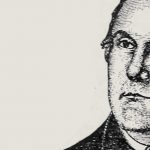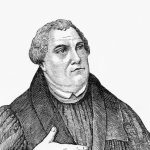Martin Luther stumbled onto the road to Worms more or less by accident.
Luther had given oaths to defend the doctrine of the church (as a “doctor”) and to help priests minister to their parishioners (as an Augustinian friar). The sale of indulgences provoked both these parts of Luther into action in 1517. By attacking indulgences in his Ninety-five Theses, Luther was challenging the power and primacy of the pope, a pillar of society, and casting doubt on the merit of observing church laws ritualistically.
Luther’s ideas were revolutionary because they were much more than a minor argument against indulgences. Rather, Luther’s opponents sensed what he was doing: challenging the entire understanding and practice of the Christian faith as a proper performance of God-prescribed ritual actions in the sacraments, under the hierarchy headed by the pope. In fact, Luther was instead claiming the Christian faith first of all hearkens to God’s promise of salvation through Christ, as revealed in his Word. Luther’s stand at the Diet of Worms reverberates throughout church history precisely because it was a momentous defense of the biblical gospel.
Journey to Worms
In the wake of the Ninety-five Theses, a storm of criticism descended on the Wittenberg professor. But the freedom Luther had discovered in the gospel empowered him to withstand the torrent. He was no longer cowering before God’s judgment throne. He stood confidently in God’s presence with Christ’s death and resurrection as the basis for his life. He felt called to carry out his vow of faithful teaching on what Scripture says. He refused to relent. That led to his excommunication in January 1521.
Luther’s ideas were revolutionary because they were much more than a minor argument against indulgences.
The Roman church was not the only institution upset with Luther. Challenges to papal authority also shook the fundamental unity of the German empire and the authority of its leaders. The fusion of church and state created a religious and political reaction to the theses by bishops and abbots who held temporal jurisdiction over certain areas; lay princes, dukes, and counts; and municipal representatives of more than 100 imperial towns not subject to those regional rulers.
Though Luther was not without allies—his ruler and silent sponsor, Frederick the Wise of Saoxny, was a powerful elector in the empire—elite figures at the top of the imperial government were fiercely trying to eliminate Luther. Even some who were sympathetic to Luther’s call for reforms hoped that Luther could heal the breach by simply renouncing his deconstruction of the medieval sacramental system in The Babylonian Captivity of the Church.
Luther’s boldness in the face of such vast political opposition should encourage us as believers today. As the active hostility of the spirit of the age grows, and Christians face the fury of frightened ideologues, we can be confident the Lord’s promise to accompany us before kings and others with power is still in force every bit as much as it was for Martin Luther (Matt. 10:16). He will enable us to testify to his saving truth in the most dire situations. Whether we are threatened with words or weapons, the Lord ensures our ultimate safety. We do not know what will result, but we rest assured that the Lord uses both the lives and the deaths of his saints to further his kingdom and bring about its coming.
Luther’s Stand Before the Emperor
While traveling to Worms to face an uncertain fate, Luther was hailed as a hero for opposing the papacy and breathing life into the widespread desire for reform. But every step toward Worms offered Luther a reminder that his life was very much in the balance. In Naumburg a priest gave him a picture of Jerome Savonarola, the Florentine reformer of a generation earlier, who was burned at the stake. Luther would not have been able to forget other reformers who met similar fates, such as the Bohemian Jan Hus. After being informed that he had been all but put on the emperor’s most wanted list, Luther said he would continue to Worms even if it held as many devils as tiles on roofs.
Luther said he would continue to Worms even if it held as many devils as tiles on roofs.
The next day Luther appeared before the diet and Emperor Charles V. The judge told Luther he could answer only two questions: were the assembled books lying before him his works, and would he follow the mandate to recant what he had written? Wittenberg law professor Jerome Schurff, serving as Luther’s legal counsel, asked that the titles of the books be read. Luther explained that some books treated faith, the salvation of souls, and God’s Word, the greatest thing on earth; he could not deny Christ. Therefore, he asked for time to consider his response to the two questions. Reluctantly, Charles agreed.
In the end, Luther explained that his works encouraging piety and good Christian behavior could not be retracted. Another group of treatises criticized false teachings and practices that undermined the Christian faith and the faithful. Those too could not be disavowed. Luther admitted that some of his writings had been written in haste and the passion of the moment that caused him to speak more harshly than was befitting a monastic and professor of Bible. He regretted that.
The judge informed Luther that his distinction among his writings was unacceptable and demanded that the heretic repudiate all his false teachings. Luther was encouraged to recant and promised that if he would, Charles would plead with Pope Leo to lift the excommunication. If he persisted in his defiance of papal authority, he would be treated as any other heretic.
Luther’s response is well-known:
Unless I am convinced by the testimony of the Scriptures or by clear reason (for I do not trust either the pope or councils alone, since it is well known that they have often erred and contradicted themselves), I am bound by the Scriptures I have quoted, and my conscience is captive to God’s Word. I cannot and I will not retract anything since it is neither safe nor right to go against conscience. May God help me! Amen.
Reports that he also said, “Here I stand; I cannot act otherwise,” appear only a quarter-century later, but these words express what he meant, even if not what he said in that moment. Luther’s stance was clear: by “clear reason” Luther meant the pope was insisting on an interpretation of Scripture that was incompatible with common logic and a straightforward reading of the Bible’s words. Luther’s conscience was more than a voice telling him right from wrong: it was an intellectual desire to embrace a true understanding of reality, with its ultimate commitment to the Creator who revealed himself in Jesus and in Scripture.
Luther was constrained by God’s Word. Herein lies another legacy of the reformer’s great stand. Like Luther, Christians perceive many kinds of threats today, but the most formidable are the threats of compromise that arise within us. Being constrained by the Word of God is indeed dangerous, as it may mean the death of false desires in our plans for life.
Christians perceive many kinds of threats today, but the most formidable are the threats of compromise that arise within us.
Even when execution by government is not imminent, faithfulness to Christ always requires the mortification of our old selves. The materialism and individualism of our culture have made “my toys” and “my rights” more important than “my neighbor,” whom the Lord placed next to himself on our “to love” list. Putting to death our inward-turned direction for life requires more courage and much stronger help from the Holy Spirit than standing up to threats to our faith from outside.
From Worms to Reformation
Imperial officials ushered Luther from the assembly as a Spanish soldier in imperial employ cried out, “To the stake with him.” The princes, nobles, and municipal representatives who constituted the diet asked for time to deliberate. The emperor did not need it. What he needed was a way to ease tensions generated by massive popular support for Luther that was causing unrest on the streets of Worms. After a fruitless week of negotiations with opposing theologians and political counselors, Luther departed Worms, and Charles proclaimed him an outlaw and mandated the eradication of his writings and followers.
Luther was captured while traveling, but this was by design of his friend Frederick, who kept him concealed at Wartburg Castle. There Luther spent 11 months translating the New Testament and writing a continuing education program, the first of his postils, and several other treatises. His message continued to spread and change both church and society.
The Diet of Worms did not much change Luther’s life. His mobility was limited by his status as an outlaw, but his words had gained a much more powerful mobility through the printing press. His continued testimony to the biblical message spread in German and Latin and in translations into Danish, English, Hungarian, Polish, Swedish, and other languages throughout Europe and finally, by our day, around the world.
Word of his stand in Worms, trusting God’s Word against pope and emperor and threats of execution, spread immediately. Other reformers under threat of exile or execution were emboldened. Many met the fate that Luther avoided, such as his Augustinian brothers Jan van der Esschen and Hendrik Voes, who two years later went to the stake in Brussels. Luther’s stance in Worms, 500 years later, still provides a model for courageous confession that Jesus remains Lord even under the worst of threats and before the highest human powers.
Luther’s stance in Worms still provides a model for courageous confession that Jesus remains Lord even under the worst of threats and before the highest human powers.
Our situation a half a millennium later is quite different from that which confronted Luther in 1521. Nonetheless, Christians increasingly encounter opposition to our faith. Believers often have one of two reactions. Some of us, when thinking about the possibility of threats of one kind or another when we confess our Lord, assert boldly (in the relative safety of the current moment) that we will always be ready to sacrifice whatever it takes to make clear that Jesus is the center and master of our existence.
In the crunch those who have been so confident beforehand often, like Peter in the garden of the high priest, look for the nearest door. Others of us are convinced that we do not have sufficient courage to stand up against any serious menace or attempt at intimidation. We should not worry. The Holy Spirit gives us the gifts we need when we need them.
Therefore, as we contemplate our daily course of life along with the world and time into which God has called us as witnesses to his name and truth, we have every reason to be of good courage and strong faith in his presence and support in our lives. Whether we feel as though we are ready to stand for him or suspect we could too easily cave in to those who oppose his Word, we can be confident the Holy Spirit remains our guide and comforter. He remains our faithful protector, the one who gives the words to speak and stand for Jesus Christ our Lord when that is what he needs us to do.
Is there enough evidence for us to believe the Gospels?





































